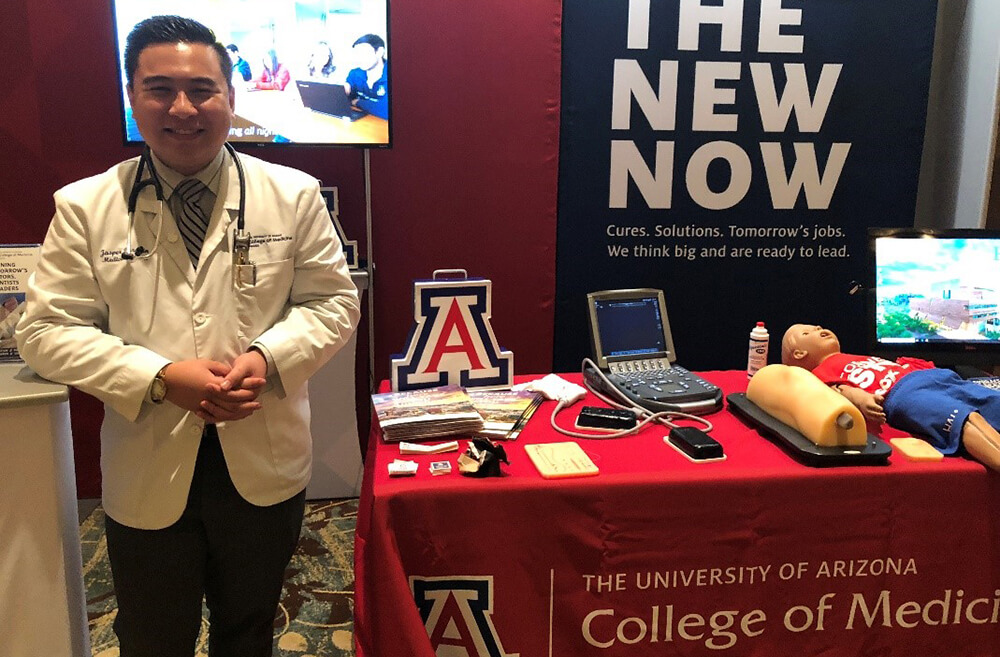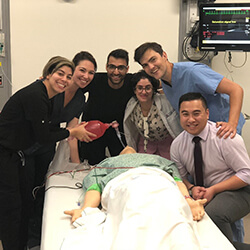
Commencement Profile - Jasper Puracan

“Mental health will be the next field within health care to have a revolution,” Jasper Puracan said. “And I think that happens now as we are dealing with a more immediate response to the financial instability of people losing jobs, homes, their entire livelihoods and even family members to the COVID-19 pandemic — which had mass mental health consequences,” said Jasper Puracan, a soon-to-be MD from the University of Arizona College of Medicine – Phoenix.

He is keenly aware of how many people do not get the mental health care they need. While mental health treatment was an issue prior to COVID-19, the pandemic amplified the urgency to adapt public policy strategies to help people.
“People are overwhelmed with the pressure of not one specific thing, but a series of small things,” Puracan said. “Mental health is still terribly stigmatized, no matter what socioeconomic or racial background you come from. I feel that I'd be able to support the individuals who are most at-risk of experiencing a mental health crisis in our communities.”
As a psychiatrist, Puracan believes mental health issues are compounded when law enforcement officials respond to a person in crisis, rather than a trained professional. He is an advocate of assertive community treatment (ACT) teams. These are small groups, typically led by a psychiatric provider, who go into the community to contact individuals on a regular basis.
“It’s important to look at what I call the context, circumstances and conditions a person lives in,” Puracan said. “Where I see my career fitting into this entire process is with the overlap between psychiatry and mental health with public health,” Puracan said. “So instead of sending in police officers who have limited mental health training, send in people with a background who can really address the situation. I think that's also a place where I might be able to have an impact in the future,” Puracan said.
He reflected on a patient he met on a previous rotation. She was a single, African American mother, who had experienced reduced work hours as a result of the pandemic. She had also suffered from anxiety due to the high-profile deaths of African Americans and concerns about policing in America.
“As a future psychiatrist, I see myself advocating for better mental health using my experience as a clinician to emphasize the need, medically speaking, to really come together and improve mental health for the community. I plan to utilize my public health and business school backgrounds to work with people outside the medical field and bring them together with leaders in our community and physician advocates.”
He believes to successfully treat people, it is necessary to combine the clinical aspects with community-focused interventions.
Puracan’s emphasis on community engagement and his commitment to provide much-needed medical services is what attracted him to Street Medicine Phoenix. He was recruited into the organization by co-founder Justin Zeien and served as the finance and marketing director.
“It was great to apply my clinical experience to provide treatment to homeless individuals and use some of the business skills I learned years ago,” Puracan said.
“My MPH internship project was to develop a social media playbook — basically a set of standards and guidelines for the next leaders to follow for consistent messaging on social media. Although I'm stepping away from my leadership role, since I’m staying in Phoenix, I’ll be able to work with the next set of leaders.”
About the College
Founded in 2007, the University of Arizona College of Medicine – Phoenix inspires and trains exemplary physicians, scientists and leaders to advance its core missions in education, research, clinical care and service to communities across Arizona. The college’s strength lies in our collaborations and partnerships with clinical affiliates, community organizations and industry sponsors. With our primary affiliate, Banner Health, we are recognized as the premier academic medical center in Phoenix. As an anchor institution of the Phoenix Bioscience Core, the college is home to signature research programs in neurosciences, cardiopulmonary diseases, immunology, informatics and metabolism. These focus areas uniquely position us to drive biomedical research and bolster economic development in the region.
As an urban institution with strong roots in rural and tribal health, the college has graduated more than 1,000 physicians and matriculates 130 students each year. Greater than 60% of matriculating students are from Arizona and many continue training at our GME sponsored residency programs, ultimately pursuing local academic and community-based opportunities. While our traditional four-year program continues to thrive, we will launch our recently approved accelerated three-year medical student curriculum with exclusive focus on primary care. This program is designed to further enhance workforce retention needs across Arizona.
The college has embarked on our strategic plan for 2025 to 2030. Learn more.